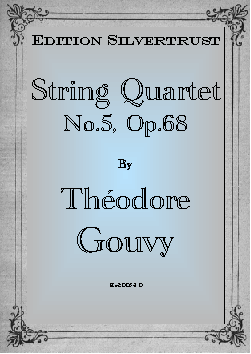Presents
Théodore Gouvy
String Quartet No.5 in c minor, Op.68
 Théodore Gouvy (1819-1898) was born into a French
speaking family in the Alsatian village of Goffontaine which at the time
belonged to Prussia. As a child, he showed no significant talent for music and
after a normal preparatory education was sent to Paris in 1836 to study law. While there, he also continued piano lessons and became friendly
with Adolphe Adam. This led to further music studies in Paris and Berlin. Gouvy, drawn
toward pure instrumental music as opposed to opera, set himself the unenviable
task of becoming a French symphonist. It was unenviable because the French, and
especially the Parisians, throughout most of the 19th century were opera-mad and
not particularly interested in pure instrumental music. It was this distain for
instrumental music in general which led to Gouvy living the last third of his
life almost entirely in Germany where he was much appreciated. During his
lifetime, his compositions, and especially his chamber music, were held in high
regard and often performed in those countries (Germany, Austria, England,
Scandinavia & Russia) where chamber music mattered. But in France, he
never achieved real acclaim. Gouvy was universally acknowledged for being a master of
form and for his deft sense of instrumental timbre. Mendelssohn and Schumann
were his models and his music developed along the lines one might have expected
of those men had they lived longer. Virtually all of his works show that he was
a gifted melodist whose music is a joy to hear.
Théodore Gouvy (1819-1898) was born into a French
speaking family in the Alsatian village of Goffontaine which at the time
belonged to Prussia. As a child, he showed no significant talent for music and
after a normal preparatory education was sent to Paris in 1836 to study law. While there, he also continued piano lessons and became friendly
with Adolphe Adam. This led to further music studies in Paris and Berlin. Gouvy, drawn
toward pure instrumental music as opposed to opera, set himself the unenviable
task of becoming a French symphonist. It was unenviable because the French, and
especially the Parisians, throughout most of the 19th century were opera-mad and
not particularly interested in pure instrumental music. It was this distain for
instrumental music in general which led to Gouvy living the last third of his
life almost entirely in Germany where he was much appreciated. During his
lifetime, his compositions, and especially his chamber music, were held in high
regard and often performed in those countries (Germany, Austria, England,
Scandinavia & Russia) where chamber music mattered. But in France, he
never achieved real acclaim. Gouvy was universally acknowledged for being a master of
form and for his deft sense of instrumental timbre. Mendelssohn and Schumann
were his models and his music developed along the lines one might have expected
of those men had they lived longer. Virtually all of his works show that he was
a gifted melodist whose music is a joy to hear.
That he and his music were held in high regard but nonetheless failed to achieve great fame is surely in part due to the fact that he was a man of some means who was not forced to earn his living from music. There has always been a bias against those who had the freedom to live for their art but did not need to live by it. Many jealous second-raters held this against him; the most notable being Fetis, a third rate composer who was nonetheless perhaps the most influential 19th century music critic. By contrast, musicians of the first rank such as Brahms, Reinecke and Joachim, who were familiar with Gouvy's music, held it in high regard.
Gouvy's Fifth String Quartet is one of his best. The first movement, Allegro con brio, begins in dramatic fashion and mixes heightened excitement with several beautiful but more relaxed episodes. The second movement, Allegretto moderato, is a moody cross between a minuet and a scherzo. The following Andante con moto is a theme and set of variations. Our soundbite shows Gouvy's very considerable compositional skill by juxtapositioning the very simple, naive opening theme next to one of the more involved and sophisticated variations which follow. In the solemn finale, Allegro agitato, Gouvy, the master craftsman, builds to an exciting and effective climax phrase by phrase.
Parts: $24.95